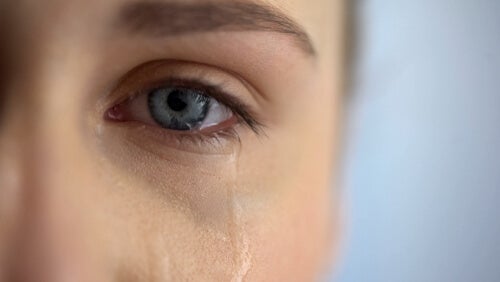COVID-19 Survivor Syndrome: A New Reality


Written and verified by the psychologist Valeria Sabater
Mental health phenomena are emerging at a rapid rate in the current pandemic. It isn’t possible to foresee exactly what effects may be coming in the following days and weeks. They’re manifesting little by little, day by day. In this regard, one that’s sadly becoming quite common is COVID-19 survivor syndrome.
This may come as a surprise to many. Every time we hear from someone who overcame the coronavirus, we experience great joy and a sense of hope. For example, we heard of the case of Alberto Bellucci, the 101-year-old Italian man who was discharged and reunited with his family. He feels lucky and his family is overjoyed.
However, not everyone is experiencing these feelings. In fact, many people are thinking:
- Why am I alive while my father died?
- Why did I survive while my brother lost his life?
- How did I suffer from mild symptoms while other people are on ventilators?
In this regard, it’s important to remember that everyone experiences crises in a particular way. We must be sensitive to these kinds of realities. Furthermore, if you or someone you know is struggling, don’t hesitate to ask for help. The first thing to understand is that you’re dealing with a very common phenomenon that occurs in many similar contexts: the survivor syndrome.

COVID-19 survivor syndrome
It’s quite clear that, in the midst of these circumstances that surround us, anxiety is like magma forming inside us, waiting to erupt outwardly. However, not everyone feels and expresses it in the same way.
Some people can barely sleep at night. Others spend the day in bed and hardly do anything apart from watching TV shows, eating, or sending messages.
Others, on the other hand, are showing an exacerbated hyperactivity. The important thing is to do things to occupy our minds so that we don’t think too much about the current situation. In addition, others who suffer from anxiety are coping as best they can with this incredibly complex situation.
However, among all these manifestations, many people are suffering from COVID-19 survivor syndrome.
Why me?
As the days go by, we discover stories that remain etched in our own minds. This is because everyone is suffering. This is a pandemic that knows no borders, nationalities, or social classes.
We’re all valuable and necessary. We’re all needed. Thus, the people who suffer from survivor syndrome manifest this suffering due to many different factors.
The hardest one is the loss of a loved one. For example, some people have lost their partners to the coronavirus. In addition, some children have lost their parents and vice versa.
In these situations, it’s common to experience anger, confusion, and guilt. Why have they suffered while I haven’t? This is the question they constantly ask themselves. On the other hand, others suffer for their sick co-workers or for those who’ve lost their jobs and face an uncertain future.
Likewise, some people who overcome the coronavirus feel trapped by the conflict. Questions form in their minds and things don’t seem real when they see other people getting sick and dying.
Survivor syndrome, a reformulation
These types of realities basically force us to give in to survivor syndrome. This condition arises after experiencing a traumatic event. It could be a war, a natural disaster, a traffic accident, an act of violence, or a terrorist attack. These events can plunge many people into a state of guilt, suffering, and constant stress.
They can experience the following symptoms:
- Irritation or moodiness
- Insomnia
- Lack of motivation
- Psychosomatic disorders, such as headaches and muscle pain
- A feeling of being disconnected from reality
- Flashbacks and memories of the traumatic event
In the case of COVID-19 survivor syndrome, the manifestations may be the same. Perhaps the most complicated difference here is that the coronavirus crisis is continually evolving, which is why it’s difficult to shake off the feelings.

What can I do if I experience feelings of guilt?
The first thing you should know is that experiencing this emotional reality is completely normal. Even more so if you lost someone close to you. Having these kinds of thoughts is understandable. The best thing you can do now is to mourn that loss by accepting all your emotions, letting off some steam, and relying on the support of those around you.
Accepting the reality of what happened without letting guilt control you is essential. On the other hand, one way to reduce the conflict and the feeling of emptiness or unreality is to connect with other people to find refuge in the process.
You must re-align yourself with your values, meanings, and priorities. Caring for those close to you and supporting friends or family who are far away can also help you.
Establishing routines, accepting your emotions, and setting new goals will allow you to focus on your life again. Understanding that some things are beyond your control and that you simply have to accept them is key to your well-being.
Mental health phenomena are emerging at a rapid rate in the current pandemic. It isn’t possible to foresee exactly what effects may be coming in the following days and weeks. They’re manifesting little by little, day by day. In this regard, one that’s sadly becoming quite common is COVID-19 survivor syndrome.
This may come as a surprise to many. Every time we hear from someone who overcame the coronavirus, we experience great joy and a sense of hope. For example, we heard of the case of Alberto Bellucci, the 101-year-old Italian man who was discharged and reunited with his family. He feels lucky and his family is overjoyed.
However, not everyone is experiencing these feelings. In fact, many people are thinking:
- Why am I alive while my father died?
- Why did I survive while my brother lost his life?
- How did I suffer from mild symptoms while other people are on ventilators?
In this regard, it’s important to remember that everyone experiences crises in a particular way. We must be sensitive to these kinds of realities. Furthermore, if you or someone you know is struggling, don’t hesitate to ask for help. The first thing to understand is that you’re dealing with a very common phenomenon that occurs in many similar contexts: the survivor syndrome.

COVID-19 survivor syndrome
It’s quite clear that, in the midst of these circumstances that surround us, anxiety is like magma forming inside us, waiting to erupt outwardly. However, not everyone feels and expresses it in the same way.
Some people can barely sleep at night. Others spend the day in bed and hardly do anything apart from watching TV shows, eating, or sending messages.
Others, on the other hand, are showing an exacerbated hyperactivity. The important thing is to do things to occupy our minds so that we don’t think too much about the current situation. In addition, others who suffer from anxiety are coping as best they can with this incredibly complex situation.
However, among all these manifestations, many people are suffering from COVID-19 survivor syndrome.
Why me?
As the days go by, we discover stories that remain etched in our own minds. This is because everyone is suffering. This is a pandemic that knows no borders, nationalities, or social classes.
We’re all valuable and necessary. We’re all needed. Thus, the people who suffer from survivor syndrome manifest this suffering due to many different factors.
The hardest one is the loss of a loved one. For example, some people have lost their partners to the coronavirus. In addition, some children have lost their parents and vice versa.
In these situations, it’s common to experience anger, confusion, and guilt. Why have they suffered while I haven’t? This is the question they constantly ask themselves. On the other hand, others suffer for their sick co-workers or for those who’ve lost their jobs and face an uncertain future.
Likewise, some people who overcome the coronavirus feel trapped by the conflict. Questions form in their minds and things don’t seem real when they see other people getting sick and dying.
Survivor syndrome, a reformulation
These types of realities basically force us to give in to survivor syndrome. This condition arises after experiencing a traumatic event. It could be a war, a natural disaster, a traffic accident, an act of violence, or a terrorist attack. These events can plunge many people into a state of guilt, suffering, and constant stress.
They can experience the following symptoms:
- Irritation or moodiness
- Insomnia
- Lack of motivation
- Psychosomatic disorders, such as headaches and muscle pain
- A feeling of being disconnected from reality
- Flashbacks and memories of the traumatic event
In the case of COVID-19 survivor syndrome, the manifestations may be the same. Perhaps the most complicated difference here is that the coronavirus crisis is continually evolving, which is why it’s difficult to shake off the feelings.

What can I do if I experience feelings of guilt?
The first thing you should know is that experiencing this emotional reality is completely normal. Even more so if you lost someone close to you. Having these kinds of thoughts is understandable. The best thing you can do now is to mourn that loss by accepting all your emotions, letting off some steam, and relying on the support of those around you.
Accepting the reality of what happened without letting guilt control you is essential. On the other hand, one way to reduce the conflict and the feeling of emptiness or unreality is to connect with other people to find refuge in the process.
You must re-align yourself with your values, meanings, and priorities. Caring for those close to you and supporting friends or family who are far away can also help you.
Establishing routines, accepting your emotions, and setting new goals will allow you to focus on your life again. Understanding that some things are beyond your control and that you simply have to accept them is key to your well-being.
This text is provided for informational purposes only and does not replace consultation with a professional. If in doubt, consult your specialist.







